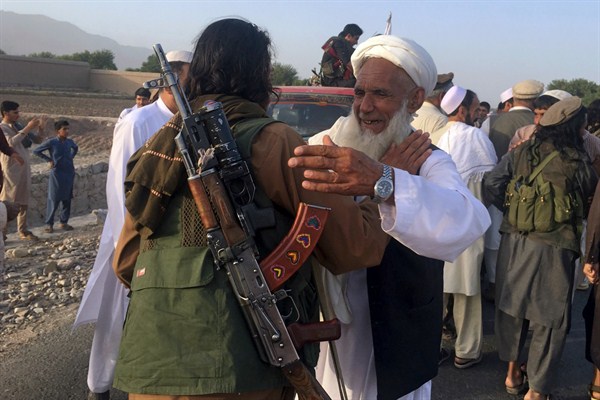A little more than a year after the launch of its new South Asia strategy, the Trump administration—without officially announcing a change in approach—appears to have refocused much of its efforts in Afghanistan around a long-elusive peace process. Gen. John Nicholson, the departing top military commander of U.S. and NATO forces in Afghanistan, backed up the Afghan government’s extended cease-fire with the Taliban during the Eid al-Fitr holiday in June, and Secretary of State Mike Pompeo recently appointed former Ambassador Zalmay Khalilzad as a new special envoy tasked with leading reconciliation efforts. But despite that summer cease-fire and some preliminary opening discussions with the Taliban, violence has persisted and full engagement on negotiations by all the warring parties is still elusive.
The Taliban have expressed interest in negotiations with the United States, and its representatives even held an initial round of direct talks with American diplomats in Qatar in late July. But the Taliban remain publicly opposed to any diplomacy with the Afghan government, whose officials were not present at the Qatar talks, as their insurgency solidifies control over more swaths of Afghanistan. Reports in late September suggest that Taliban and Afghan government representatives held preliminary talks in Saudi Arabia, although the Taliban’s spokesmen publicly denied that those meetings took place. A second round of “unofficial” talks with U.S. diplomats were also reportedly held at that time, with both Afghan and American negotiators apparently seeking another cease-fire commitment during Afghanistan’s parliamentary elections scheduled to take place on Oct. 20.
After previous unsuccessful attempts by President Ashraf Ghani early in his term to negotiate a settlement through talks with Pakistan, a principal sponsor of the Taliban, the Afghan government made a public offer in late February to engage in peace talks with the Taliban “without preconditions.” Ghani later took the dramatic step of announcing the unilateral cease-fire, subsequently matched by the Taliban, during the three-day holiday in June marking the end of Ramadan. The government, through its High Peace Council, has also supported a program of outreach to religious scholars in other Muslim countries, including Indonesia and Saudi Arabia, in an effort to put more pressure on the Taliban to come to the table—although the insurgents have dismissed the significance of those appeals.

